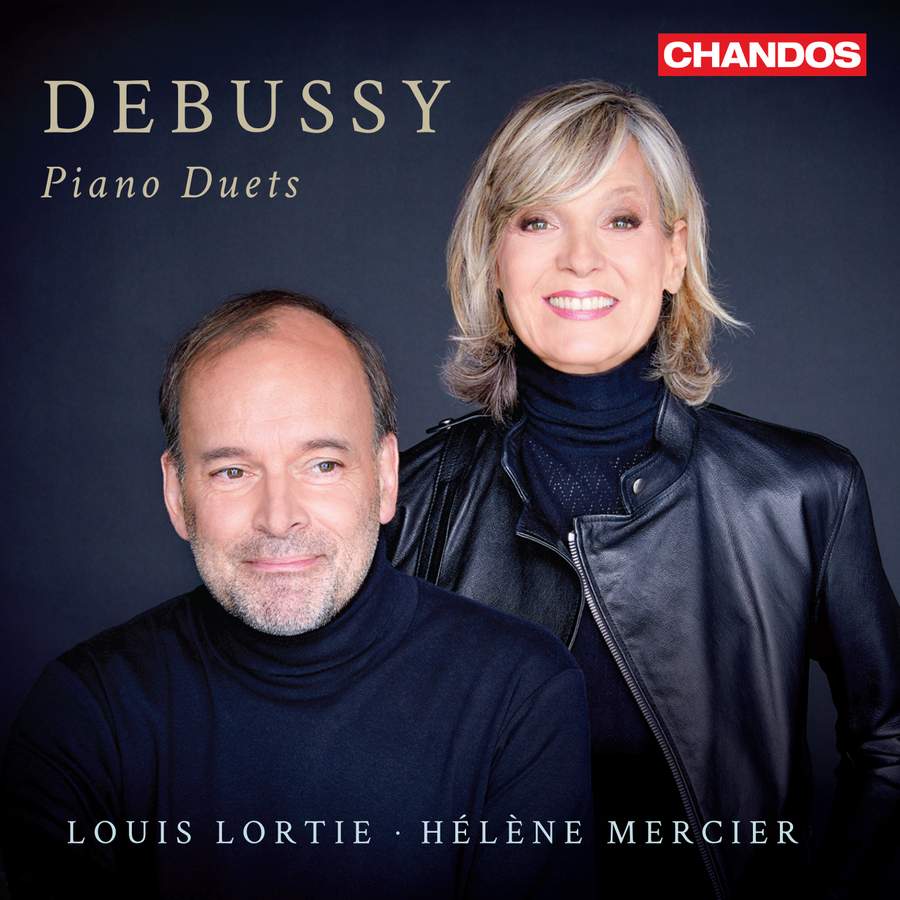DEBUSSY Piano Duets (Louis Lortie, Hélène Mercier)
View record and artist detailsRecord and Artist Details
Genre:
Instrumental
Label: Chandos
Magazine Review Date: 11/2022
Media Format: CD or Download
Media Runtime: 81
Mastering:
DDD
Catalogue Number: CHAN20228

Tracks:
| Composition | Artist Credit |
|---|---|
| Petite suite |
Claude Debussy, Composer
Hélène Mercier, Piano Louis Lortie, Piano |
| (2) Arabesques, Movement: No 1 |
Claude Debussy, Composer
Hélène Mercier, Piano Louis Lortie, Piano |
| (6) Epigraphes antiques |
Claude Debussy, Composer
Hélène Mercier, Piano Louis Lortie, Piano |
| (24) Préludes, Movement: La fille aux cheveux de lin |
Claude Debussy, Composer
Hélène Mercier, Piano Louis Lortie, Piano |
| Andante cantabile |
Claude Debussy, Composer
Hélène Mercier, Piano Louis Lortie, Piano |
| Ballade slave |
Claude Debussy, Composer
Hélène Mercier, Piano Louis Lortie, Piano |
| Marche écossaise sur un thème populaire |
Claude Debussy, Composer
Hélène Mercier, Piano Louis Lortie, Piano |
| (La) Mer |
Claude Debussy, Composer
Hélène Mercier, Piano Louis Lortie, Piano |
Author: Harriet Smith
The selling-point of this enterprisingly programmed Debussy album is a newly designed concert grand from Bösendorfer – the 280 VC – which promises the traditional warmth associated with this manufacturer, harnessed to 21st-century technology. All well and good, but ironically Chandos’s generous recorded acoustic, made in the Concert Hall at Snape, makes it difficult to judge precisely the instrument’s qualities.
Louis Lortie and Hélène Mercier have stiff competition in the Petite suite and Épigraphes antiques in the form of Paul Lewis and Steven Osborne, whose playing so delighted me last year (Hyperion, 4/21). Despite the French Canadian credentials of Lortie and Mercier, I find them a little short on Gallic charm in the suite’s opening ‘En bateau’, while their ‘Menuet’ is a mistier affair than Lewis/Osborne (whether down to pedalling or acoustic it’s hard to say), though they convey effectively the bustling good humour of the ‘Ballet’. That mistiness is amply applied to the Épigraphes, too, which are most effective in the haunting No 2, ‘Pour un tombeau sans nom’, and the languorous No 5, ‘Pour l’égyptienne’. Less convincing are No 3, ‘Pour que la nuit soit propice’, which sounds too slow, and No 4, ‘Pour la danseuse aux crotales’, whose subject cuts a considerably less flirtatious figure than the one conjured by Lewis and Osborne.
From here, we move to rarer fare: transcriptions by Léon Roques reimagine for two pianos the First Arabesque and the flaxen-haired girl, imbuing Debussy’s originals with various doublings, octave displacements and so on, which seem to give undue heft to the music, skilfully played though they are.
The early Andante cantabile for piano duet is given on two pianos with more elegance than by the foursquare Christian Ivaldi and Noël Lee (Warner), but musically it’s slight fare. Similarly, the Ballade slave, reworked for piano duet by Gustave Samazeuilh, fails to make much of an impression – just spend a moment or two with Jacques Février in the original version and you’re immediately caught up in a more dramatically etched narrative.
To end we have La mer in its two-piano incarnation by André Caplet. Let’s not lose sight of the fact that this arrangement is far more taxing than it actually sounds, not merely in terms of the physical challenges but in the need to coax from the pianos the most wide-ranging colour palette and display a true understanding of texture and narrative flow. Unfortunately, here, I was mostly reminded of the work’s unpianistic qualities. The muted openings of the first two movements needed a greater sense of mystery, while too often significant moments within the seascape passed for relatively little: from 4'33" in ‘De l’aube à midi sur la mer’, for example, which in the score signals a faster cello-centric section marked Très rhythmé and which here was relatively stolid-sounding; or the storm-tossed ‘Dialogue du vent et de la mer’, which began promisingly but then never really built enough of a crescendo. In the end, sadly, this sounded more like a play-through than a genuine performance.
Discover the world's largest classical music catalogue with Presto Music.

Gramophone Digital Club
- Digital Edition
- Digital Archive
- Reviews Database
- Full website access
From £8.75 / month
Subscribe
Gramophone Full Club
- Print Edition
- Digital Edition
- Digital Archive
- Reviews Database
- Full website access
From £11.00 / month
Subscribe
If you are a library, university or other organisation that would be interested in an institutional subscription to Gramophone please click here for further information.




